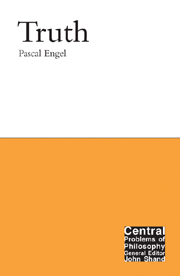Preface
Summary
Philosophical work on truth has been quite abundant during recent decades. This book is an introduction to this work, but one that does not go into the wealth of logical detail that has often characterized a number of treatments of these issues. Moreover, as the topic touches most other subjects within the broad areas of philosophical logic, semantics and epistemology – such as the nature of the bearers of truth and falsity, quantification, vagueness, reference, conditionals, modal and intuitionist logics, logical paradoxes, and the definitions of knowledge and justification – the reader will not find here the technicalities that provide both the difficulty and the charm of a large battle fought on so many fronts. Instead I have preferred to focus on the overall map of the battle, and to indicate the significance of the various theories for the rest of philosophy. This is why the book is centrally concerned with one of the most discussed topics in the recent philosophical literature, the “deflationist” or “minimalist” theories of truth. They are attractive because they promise to solve or to dissolve some of the main problems of philosophy – such as the debates between realism and anti-realism – by making truth a relatively simple thing. But their apparent modesty hides in fact quite ambitious and complex implications, which I have tried to describe, and which, it seems to me, far from showing that the problem of the nature of truth can be put to one side and make us free to deal with other questions, obliges us to think more about why truth matters.
- Type
- Chapter
- Information
- Truth , pp. vii - viiiPublisher: Acumen PublishingPrint publication year: 2002



